Friday, April 29, 2005
COLOR
I don't know if I've linked before to the blog of Karl Dubost, but if not, it's my sin of omission..mea culpa. The blog itself is in French, but, English readers, please don't let that deter you: Karl is a photographer and a traveler who goes often to Asia, and he has an extraordinary eye, especially for color. Visiting his often ravishing, always surprising site is a delight and almost a meditation in my day: here I encounter a world drenched in color, now pulsating with life, now quiet in the repose of objects and persons, populated with juxtapositions one senses only this camera has seen. There is usually a short poem, in French or English, at the beginning of the day's entry, usually well worth figuring out even if it is not in your usual language.
6:04 PM
|

Just Spring...Vermont
HIGH
On Wednesday, we had our usual lunch with my father-in-law, and toward the end of the meal we were joined by his friend B., another resident of the retirement home. B., a former professor, was in Beirut at the American University for a time with his wife, and they’re both very appreciative of the Middle East – his wife now takes Arabic lessons once a week from my father-in-law. We had gotten to know them prior to the whole retirement home deal, through Middle East peace work, and when they moved there we were pretty sure that they and J.’s father would become friends.
When he first moved in, my father-in-law had said all he wanted was to be left alone; he reluctantly went down to the dining room for meals and ate alone when he could. The other residents were “boring”, or they were “only interested in sports” or they “didn’t care about foreign affairs”. And besides, he said, he couldn’t hear anything. As had been usual throughout the time I’ve known him, he’d say so-and-so was “very decent” – which was a polite put-down, translated within the family as “they’re nice but not intellectual”. But gradually he began to make friends – or, more accurately, people began to make friends with him, despite his former intentions. Now, several years down the road, as we walk down the hall or go through the dining room, the affection and respect the other residents and staff have for him is very obvious, and his caring for them is genuine.
Not long ago he told me he had at least a dozen very good friends there, and admitted, without a single qualifier, that that was more than he’d ever had before in his life. His best friends are probably B. and his wife, and N., a woman who is a writer, an avid reader, and, God forbid, an Episcopalian. In fact, all three of these friends are pretty devout, practicing, liberal Christians – a humorous irony that isn’t lost on my "humanist" father-in-law.
After he retired, my father-in-law wrote three full-length books. They are fictional biographies of religious figures, set in the Middle East that he knows so well, but too creatively non-traditional to suit a religious market, and too religious to suit a publisher of fiction. They’re written in a flowery story-telling style, often veering off into the poetic and philosophical, that I’ve come to recognize as typically Arab, and although the English is grammatically perfect, the style seems very strange to a westerner. To my father-in-law, though, they are brilliant, and the greatest disappointment of his life has been his inability to find someone to publish them.
That is, until B. came along and decided to start a publishing company and bring out one of these books. This has been quite a saga, with some family involvement and help with the intricacies of digital on-demand publishing, but it’s happening, and both B. and my father-in-law are all excited, and hanging on to their own precarious health in order to see the project to completion. They were already good friends before this project, but they’ve gotten a lot closer, and on Wednesday it was great fun to see the two of them teasing each other and talking naturally together, almost as if “the children” weren’t listening.
Somehow, talking about prep schools and colleges in the 1960s, we got onto the subject of drugs. B. turned to my father-in-law, and asked him if he’d ever smoked dope…
(to be continued)
3:33 PM
|
Tuesday, April 26, 2005
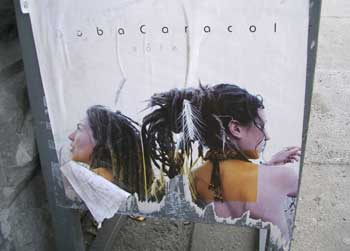
If all goes as planned, we'll have lunch with my father-in-law tomorrow noon and then head north for a week. This has been another intense week of work, culminating with a presentation this afternoon; all that went pretty well and if the boss doesn't do something unpredictable tomorrow, we might actually have a few days to regroup and relax. I wonder, especially in exhausted and frustrated moments, why I still do this - and the answer is that it's fun, on certain levels. Today we met some new people, consultants from D.C., and they were smart, interesting, engaged, very likeable, and impressed with what we showed them. It's that stuff - the chemistry, the creation of teams trying to fulfil a challenging and worthwhile goal, the figuring out how to do something new from scratch - that makes communications work fun and interesting, even when it's also maddening.
On the other hand, there are limits.
10:46 PM
|
Monday, April 25, 2005
INCIDENTS
1. Early morning; a black beetle is on its back in the shiny white free-standing bathtub. I offer it the pad of my index finger; after nervous faltering it climbs on board. I give it a ride up to the pot of grape ivy, near the skylight; it disappears over the rim.
2. The rain has stopped but the day is still blustery and cold. Walking to the post office, I notice drowned worms on the sidewalk - one of the more unfortunate signs of spring. In front of me, a larger worm, covered with grit, is trying to head across the sidewalk and into the road. I go past, turn around, pick it up and set it down in the wet grass. This action is immediately followed by a memory of how many worms I put on fishhooks as a child.
3. I notice that the river is very high.
4. Across the bank, sirens. An white ambulance with red lights flashing heads across the bridge, toward the village.
5. Three sleek crows land, cawing, in the bare sycamore saplings on the river's edge. One crow has a beakful of leaves. All around the birds hang last fall's sycamore fruits on their long stems, like Christmas balls, or dangly earrings from the 60s.
6. When I come out of the post office, the ambulance is above me on a dead-end street. I used to know the people who lived in that house. The village is silent now: no siren, no crows.
7. In front of the tenement on the corner, the green leaves of the young maple trees are curled in swollen buds, like fists.
6:56 PM
|
Saturday, April 23, 2005
GOTTA LOVE THOSE MOUNTIES
Royal Canadian Mounted Police to escort gay married couple to "40 Heroes" Celebration in Philadelphia on May 1.
Kevin Bourassa and Joe Varnell will be honored at a GLBT civil rights event in Philadelphia on Sunday, May 1. Bourassa and Varnell were the first gay couple to be legally married in North America. Two RCMP officers will accompany them to symbolize Canada's commitment to same-sex couples.
The trip will be a far cry from one Bourassa and Varnell attempted to make shortly after their marriage in 2003. The couple was turned back by US Customs and Immigration officers when they attempted to board a flight from Toronto to Georgia. US Customs and Immigration pre-check people traveling to the US at most major Canadian airports. They couple was rejected after filling out a form identifying themselves as a family.
Other recipients of the "40 Heroes" awards are Martina Navratilova, Melissa Etheridge, Barney Frank, Gene Robinson, and Ellen DeGeneres.
AND A MORE POIGNANT NOTE:
This anonymous letter at Planet Out! from a gay Catholic priest describes his reaction to the election of the new pope, and is a poignant commentary on what "keeping the faith" means for someone in his situation. I was interested, and glad, to see that he mentions Bishop Gene Robinson as someone whose witness has helped him continue under very difficult circumstances.
2:26 PM
|
Friday, April 22, 2005
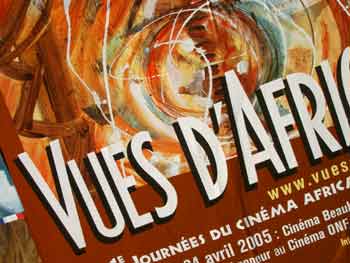
HOLDING THE LINE
“I had a very good day yesterday,” announces my father-in-law, as he settles into his chair. From the buffet, he’s brought back a plate of salad greens topped with baby carrots and ringed with six big strawberries, and another plate with a grilled hamburger from the buffet. He peers under the bun, and starts carefully spreading the hamburger with ketchup, mustard, and relish that he’s arranged in layers in one of those tiny folded paper cups that mints or condiments are served in.
“What was especially good about it?” we ask.
“Well, for one thing I was pleased with the new pope. And I wrote a few letters, which was something I haven’t been able to do at all lately.”
“You were pleased with the pope?” I’m astounded that he’d say this; a few weeks ago he made it clear he was completely disgusted with the entire thing.
“Oh yes,” he says, nonchalantly, and goes on preparing his hamburger. J. looks at him, hard, shakes his head, and goes off to get something he’s forgotten in the buffet line.
I'm somewhat at a loss. “You are kidding about the pope, aren’t you?”
“No! I think he’s an excellent choice.”
“You don’t think he’s too conservative?”
“Someone has to hold the line.”
“What? So you really think it’s good to have someone in there who, let’s see, forbids contraception?” Now I'm getting suspicious; it looks like he’s enjoying this; his eyes are half serious, half mischievous, and he knows I can’t tell exactly where he’s going to land today.
“Sure. Someone needs to be against contraception…and that other thing…” he makes vague gestures in the direction of his abdomen.
“Abortion.”
“Yes. And no…”
“No women priests.”
“Exactly.” He crunches decisively on a baby carrot.
“Come on,” I say.
“No, I mean it,” he says. “Somebody needs to counteract my liberalism, you see. I worry that there is too much liberalism like mine and unless it’s opposed…”
“People will go wild.”
He nods, and takes an appreciative bite of his hamburger. “I’ve put on weight in the last two weeks,” he says. “I need to watch it. But you should eat more. Go gets some cake.”
“I’ll get something else later,” I tell him. “Now, do you really think that?"
“Yes! Did I ever tell you – once the prep school where I was teaching sent me as a ‘delegate’ to a Catholic prep school conference, so I went, and there was a theological discussion in which everybody seemed to be taking a very liberal point of view. So I decided, for the fun of it, to take the opposite view, and I argued the strictest, most conservative Catholic position. Afterwards one of the priests came up to me and whispered, ‘That was very impressive – may I ask, what Order are you a member of?’”
"Maybe you should go to Africa," I tell him. "You might fit right in with those conservative bishops."
He looks up in mock horror. "I don't think so!"
I look at him, grinning, and shake my head. He seems very pleased by the memory. "You see," he says, "if no one takes the traditional view, there's no one for me to push against."
And I still don't know what he really thinks.
4:07 PM
|
Wednesday, April 20, 2005
GRIMALDI'S
At Idle Words, a commentary on New York-style pizza, a subject dear to my heart. J., who is at this very moment making pizza crust in the kitchen, has been a pizza aficionado since long before we met; it was clear to me at the start that loving pizza was going to be synonymous with loving him. In his post, Maciej describes several pizza places we also count among the very top - Pepe's in New Haven, is our #1 - their white pizza, a blend of garlic, clams, parmesan, and olive oil on the best crust you have ever eaten, served unpretentiously on a rectangular tray, is well worth the drive off the highway into the city, and the potential wait to get served. And Grimaldi's, at the end of the Brooklyn Bridge, also makes our top five. What about John's, in the Village? We've never, however, eaten Staten Island pizza, and it sounds like we've missed the best of the best.
Grimaldi's made it into a poem I wrote a long while back - and it's as good a time as any to post it. That was another early spring day, much like this one. The "Kim" in question is now a late-teenager, with bright red-dyed hair; she is escaping as best she can.
Two Dollars a Day
After pizza at Patsy Grimaldi’s
we walked past tulip gardens and pear trees
and then across the Brooklyn Bridge
at sunset
with the skylight still glowing
and the riches of Manhattan sparkling blue and gold and silver.
Liberty beckoned from the harbor;
the Verrazzano, a diamond necklace in the distance.
Lacework cables above us,
bicyclists rattling the wooden decking;
a big black jogger,
woman in a suit and Nikes,
other lovers.
Beneath city hall and its gilded dome
down to the trains
where a Frenchwoman read philosphy
and a black couple leaned against each other
uptown to 32nd Street and out
into the city night
small again on the fast streets full
of yellow taxis and hot smells
and people intent
on their destination.
----
“Where did you go?” said Kimmy,
who had fed the cat and brought in the papers.
“New York,” we said. “Have you ever been there?”
and she said no,
she had never been anywhere except
California once and it was wonderful,
there was so much happening! And here
nothing ever, ever happened, except they had
a new puppy, which liked to bite her.
So she took her dollars and went back home,
and later in the day
I saw her riding her bicycle up and down the street,
the way she’s always liked,
and she smiled brightly
and pedalled furiously
as if she had somewhere important to go.
4/27/97
6:49 PM
|
Tuesday, April 19, 2005
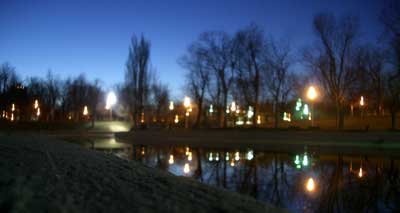
Last night was too warm and too lovely to spend inside. We walked in the park, along the serpentine lake, and then, reluctant to go in, got our bikes and rode up absolutely quiet, nearly deserted streets, past cars parked along the sides shining like dark green and black carapaces under the indefinite streetlights; the sound of a piano or a violin drifting from a window, yellow light behind lace; an occasional rustle revealing a mother coming home with a child; someone bringing in a folding chair; a cat; a woman with a cigarette gazing at the street from the shadows on a third-floor balcony.
I caught up with J. and we rode side-by-side on the dreamy street, saying nothing, reaching out once to touch hands.
Across on St. Gregoire, at the top of the Plateau -- and then coasted back home.
5:32 PM
|
Monday, April 18, 2005
A COUPLE OF LINKS
There's a wonderful story at FunnyAccent which gives a different take on running in Boston, and on the difference we can make without even knowing it.
Thanks to Language Hat, who linked to my post on language-learning, I found a new blog, amusingly named "La Coquette / Don't Hate Me Because I Live in Paris". She too is learning French, and since I had had a similar experience getting new contact lenses, I related to her story of a French eye exam.
And then there's, well, this bit of stranger-than-fiction, from the oddball humorists at the BBC.
7:59 PM
|
Sunday, April 17, 2005
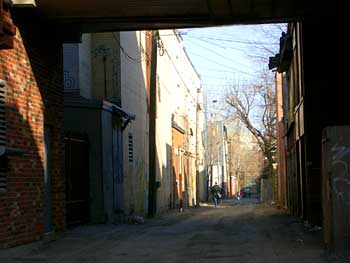
We rode our bikes through nearly-empty streets this morning for the 10:00 church service at the cathedral; it was the first time we've been able to do that this spring, and it felt great. Our usual route takes us down the Av. Berri bike path past the new and about-to-open Bibliotheque Nationale with its pale aqua louvered glass facades, and then along Maisonneuve past Place des Arts into downtown. This morning as we waited for the light near Jeanne Mance, a woman rode by wearing a retro black-and-white checked coat-dress with a tight waist, 3/4 length sleeves and flared skirt, black fishnet stockings, black flats, and oval black movie-star sunglasses; she had a bright pink milk crate on the back of her bike. She looked like she had walked out of Lauren Bacall/Humphry Bogart movie - it was a great outfit, and she had the attitude to go with it - some study had definitely gone into that one.
I just washed down the planters and bench out on the terrace; the sliding doors are open and every now and then the sound of the traffic and bicycle wheels is broken by the voices of a passing group, talking happily in French. I want to thank everyone who commented on my post about language frustrations; I'm sorry I couldn't write back personally to everybody because I really appreciated what you said. Hearing your experiences not only encouraged me but reinforced the fact that this is a universal feeling that one simply has to go through on the way to becoming more fluent and more comfortable. Most days I just enjoy the bilingualism of the city and go with the flow of it; it's easy to see that I've made a lot of progress just from noticing how much more easily I understand whatever spoken French I hear and how much more comfortable I am in various situation than I was when I first came. Along with humility, I think another lesson to be learned is patience!
This morning quietness, combined with the beautiful music and sense of peace, shared commitment, and community I've come to find at the Cathedral, have helped me rejuvenate after many days of very intense work. I could feel myself fraying on Friday and Saturday: very much in need of a break and some extra rest, if not sleep. I still feel tired but much better than I did. I like the work I'm doing a lot, and feel grateful for it - as usual, the question is balance and taking care of myself, something I've come to accept as a continual task and responsibility, not a place I'm going to arrive at and stay without readjustment.
4:03 PM
|
Saturday, April 16, 2005

MOULTING DAY
It's today: moulting day, when Montrealers shed their dull winter garb, the heavy layers, the scarves and hats and fleece and fur, and...get naked! It's the first weekend day of the warm weather, and the warmest day we've had yet. Like colorful butterflies, an entirely new flock seems to be passing by my window. They're on bikes, on roller blades, on skateboards, in baby carraiges; on running feet and slow old feet, on barely-able-to-walk-yet feet, and on four paws. It's fabulous, as if everyone has suddenly been set free, and they're celelebrating in motion, in color, in cafe-windows flung open, in an exuberance of winter-pale skin bared to the sunlight.
We're going to friends' tonight for the first barbeque of the season, and I offered to bring strawberry shortcake; the shortcake is baking in the oven right now, awaiting the basket of strawberries we brought home yesterday from the Jean Talon market. It's the first cake I've baked here; with boulangeries such as there are in this city, I'm afraid my Vermont country baking has seemed, well, superfluous. But the scent of butter, sugar, vanilla, ginger, and browned almonds is lovely in the house today; I'm going to play my flute a little, with the door open to the outside, where, above the happy people and happy dogs and children in their carriages, a light blue sky is crossed with a delicate tracing of tree branches, each dotted with swelling buds of almost-leaves.
5:36 PM
|
Thursday, April 14, 2005

OF LOCKS AND KEYS
The other day I went to the local locksmith because we needed two keys copied. One was straightforward, and I was sure it wouldn’t be a problem, but the other was for a bicycle lock. The locksmith shop is on Papineau; I’ve been there several times and so I know that the proprietor doesn’t speak anything but French. On the way, I figured out how to ask for what I needed. Once inside the shop, we greeted each other, and I handed him the first key and asked for two copies. He nodded and asked if that was all. I said no, and handed him the other key, asking if he could make a copy of it. Suddenly, there was a torrent of French – an explanation, I assumed, of why he couldn’t copy the key – but I could hardly understand any of it. From his inflection, I realized he had ended with a question – which of course I couldn’t answer, so I stood there, staring at him dumbly, helplessly. He repeated the question – it seemed he was confirming whether or not it was a bicycle key. I said yes, it was a bicycle key. More incomprehensible French. I shook my head and said thank you. He handed me back the key, looked at me with a certain disdain, and set about making the first copy while I dropped the bicycle key into my purse feeling, well, vulnerable and not very happy. I didn’t blame him – he’s a nice enough man – after I paid him he started waiting on a French woman who had just come in, and he was smiling and making polite chatter. If I had been able to banter with him, he would have been just as pleasant to me.
So then I walked down Marie-Anne several long blocks to the bike shop where we bought our bikes last summer. The shop was bustling and packed to the handlebars with bikes and accessories. The young clerk I remembered from last year was there, waiting on someone at the counter, so I stood in line until he was free. He doesn’t speak anything but French either, but he’s a different sort of guy. I asked my question, told him I had lost one of the bicycle keys, was it possible to obtain a replacement? So far so good. “C’est perdu?” he confirmed. “Oui.” He looked at a loss, and asked if I had gone to a locksmith. I said I had, but now, two or three sentences deep into the subject, I was running out of explanatory words. He motioned to me to wait, and gestured toward the other clerk, who I gathered spoke English. He was busy, and a young Asian woman - another customer – who spoke flawless French and English kindly offered some suggestions about who might be able to replace the key for me. I thanked her and the clerk and then asked about a pannier, a basket for the back of my bike, trying to go back to French, and we concluded our discussion in the usual two-language back-and-forth I’ve come to expect in most places here.
But somehow, this experience, on that particular day, threw me. I left and started walking home, feeling like I might cry. “It doesn’t matter how long I live here or how hard I try,” I said to myself, miserably, “I’ll never master this language completely, and I will never, ever fit in. What are we doing, choosing to live in the Plateau where anglophones are already resented?” Luckily I saw that I was passing a favorite bakery, so I went in and bought a couple of cookies – a transaction for which I didn’t need any specialized language. But even chocolate didn’t lift my spirits quite enough, and the helpless, isolated feeling haunted me the rest of the day.
Yesterday, though, I found myself taking care of my former landlady’s little girl, as a favor while the mother did an emergency errand. Left alone with the daughter, and a menagerie of stuffed animals and plastic dinosaurs, I was able to think back to last May when we first lived here and I would try to play with M. and barely understand a single word she said, while she’d look at me like some strange dumb animal, screwing up her little face in puzzlement and frustration and demanding, “Quoi???” She’d never had to deal with non-French speakers in her short, highly animated and very verbal life. But there I was yesterday, able to talk to her, able to understand much of what she said, even able to concoct some games and comfort her when she decided her mother was never coming back.
“So, that’s it, I’m at a three-year-old level,” I thought, wryly, feeling a bit more able to laugh at myself. “Everyone who finds themselves in a foreign country must feel this, and yet they learn the language, they manage.” I told myself, “Come on, you’re doing your best, look at all you’ve learned.” Gradually I did feel better, and I was grateful to my little friend for giving me a yardstick for measuring some progress. Still, there is something about feeling cut off verbally that is deeply disturbing to me, and it obviously goes to the core of who I am.
As I thought about it more, I decided that it wasn’t so much an inability to make myself understood – for I’m pretty good at that, using language or not – as it was not being able to understand others, and how humiliated I feel when they instantly switch to English, or turn their backs – whether the gesture is real or only felt. The switching, I’ve found, is often Canadian politeness, and most people will continue in French if you tell them you’re trying to learn and improve. I recognized that discomfiture was also coming from a bruised ego. I am not only a word person, and someone who wants to communicate and know other people, but I’m an over-achiever, and I can’t stand feeling stupid or unaccomplished, especially in this sphere. That’s a hard thing to admit, and a deeper one to face squarely, but I’m sure it’s yet another lesson in humility that’s important for me to experience -- or it wouldn’t be happening in such a total and unavoidable way, with my own willing, if sometimes uncomfortable, participation.
9:03 PM
|
Tuesday, April 12, 2005
NEWS BITS
A couple of items from today's Montreal Gazette:
Let's not Arm Border Guards
"Providing Canada’s border guards with sidearms would be a “dangerous move” and contribute little to improving national security, according to RCMP (Royal Canadian Mounted Police)Commissioner Giuliano Zaccardelli. “I know being at the border can be risky and there are certain dangers,” he said yesterday. “But somebody who runs through the border and having a customs officer run out of his hut and shoot after them – I’m not sure we want to do that.” He said he’s against arming people “simply to create the notion that we are going to feel more secure.” Zaccardelli made the comments before a parliamentary committee reviewing Canada’s anti-terrorism legislation yesterday. "
Community Bands Together to Rehabilitate Youthful Mugger
Along with many others, we've been following the story of an 18-year-old young man who robbed a 90-year-old woman and shoved her down some stairs in the metro a while back. Apparently the young man, the son of a mentally-ill anglophone mother and Armenian father, had suffered such neglect and difficulties in his childhood that once his story came out, both this local community and the victim have pled for leniency and rehabilitation rather than punishment. The boy's mother committed suicide in 2003 after years of refusing to talk to her son. In January, his father "dropped him in Montreal with $100 in his pocket in order for him “to become a man,” one witness said. At the time of the mugging, he had been living with friends for a few weeks.
One thing we've noticed in reporting about the rare violent crimes that do occur here, is that the papers and community and justice system always seem to ask and report how the victims feel about the crime and the sentence. To us this seems old-fashioned, quaint, idealistic...and amazing, if it actually works. And it seems like although religion may not be expressed in the way it used to be, through church attendance, devotion, and loyalty to priestly authority, the values of forgiveness and reconciliation are still at work in this society. Read a couple of quotes from this article, entitled "Métro mugger needs love – not prison, supporters say."
Emrys Brooks Djierdjian made a terrible mistake when he robbed a 90-year-old woman and shoved her down some stairs, but he is a teen in need of love and support, not prison time, say friends and neighbours from his small village who have stepped forward to take him under their collective wing...
[people]... from the village of 2,000, 60 kilometres north of Montreal, said they decided as a group that instead of sitting back and watching bad news on television or reading about it in the paper, they would take some responsibility as members of society. They’ve raised money to pay for any therapy Brooks Djierdjian needs. One has offered him a job. Even the victim, Gemma Martel, who suffered a fractured pelvis, broken arm and bleeding in the brain, has written a letter of forgiveness to her aggressor, said supporter Catherine Ruiz-Gomar. “If this society believes in rehabilitation, then we need to give people the means to do it,” Lamarre [a neighbor] said.
The judge is scheduled to make a decision in the case tomorrow.
7:39 PM
|
At the border, the douaniere asks us for our license plate number: “I’m afraid I can’t read it,” she says, smiling. We laugh and tell her the number, and she cheerfully waves us through. She’s right; the car is covered with road spray and salt – an indication both of this place and season, and a life that’s lately had few chinks in it for such things as washing one’s car.
It’s a beautiful day - cold, sunny and clear - and the wind buffets the small car from side to side as we cross into the flat plain where flocks of geese stand in the corn-stubble of the endless fields where clods of black earth plowed last fall lie thawing in the sunlight. Silvery pools shine in the curving furrows where the plow approached the road and made its wide turn back toward the east, and the long drainage trenches, stretching to the horizon as straight as a column of mercury, send a sudden reflective flash as we pass by.
I wondered, at first, if I’d become bored over time with this drive through so much apparent sameness; I grew up, after all, in a very different agricultural landscape that has always seemed to me the epitome of pastoral beauty with its varied fields of hay and corn and oats, its hedgerows and orchards; woods on the higher ground and blackbird-busy swamps in the lowlands; herds of black-and-white dairy cows in the pastures and sheep, goats, geese and chickens in mud-luscious farmyards. What was the appeal of acres upon flat acres of nothing but corn, on a land scoured flat by water and glacier and swept by a constant wind whose only positive purpose seemed to be keeping aloft the white fleur-de-lis on the blue fields of the Quebec flags fluttering in so many farmyards?
Perhaps it was that blue that gave me the clue yesterday, as I looked again at this land that, I realize, has stolen its way into my heart: it may look vast and all the same, but it’s a sameness like the ocean, a sameness that changes its face with the day and the season. One has to look harder, perhaps, to perceive it, but within the wheel of the seasons rolling over these raw and elemental fields, a smaller wheel turns by the day: the differences in the play of light depending on the clouds and the sun or lack thereof; the angle of the wind and its strength; the presence of birds and their tendency, depending on their own cycles, to lift off the ground in wide flocks or scatter individually; to stand, satiated, and observe, or to be on the move, as the geese were yesterday, flying in low purposeful lines above the waiting fields dotted, in the far distances, by a steeple, a cluster of houses, and the silos where the golden products of so much flatness are stored, for a time, in the sky.
9:39 AM
|
Sunday, April 10, 2005

A long weekend of mostly work, and I'm not done yet. This morning I was the organizer and one of the presenters for a talk on the Windsor Report and the future of the Anglican Communion, and it took most of yesterday afternoon to prepare for that. Yesterday morning and this afternoon I've been preparing for a business meeting tomorrow. After that, in the afternoon, we're heading north, which I'm looking forward to very much indeed.
We've had a string of fabulous, unseasonably warm days in New England, and there was time to get outside and uncover the vegetable garden and most of the perennials, rake leaves, get a permit to burn some brush, and do a lot of our usual spring clean-up. And, oh, it felt glorious to be out there with the sun on my back and the smell of the earth coming up from the mud and the wakening grass! There's a patch of snowdrops from my late grandparents' garden in bloom, and another of delicate pale blue crocuses; during the past few days nearly all the snow and ice disappeared from its final banks on the north side of the house, leaving undulating frost heaves and squishy earth. How good it is to feel my hands in the soil again, pulling dry leaves from the base of the lavender and the peonies, discovering the pale red shoots of tulips, running my fingers over the soft green "fur" of the lambs' ears. And when the sun has set and I open the back door, it's a robin who scolds me from the apple tree, reclaiming her world.
8:32 PM
|
Friday, April 08, 2005
NOTE TO READERS
Like many Blogger users, apparently, I've been having trouble accessing my account and posting. This shouldn't affect readers who try to view the blog, but if it looks like I'm not posting regularly, that's the reason. I've taken steps to do what I can to fix the problem from this end in the short term (clearing cookies, basically); in the longer term it's likely that I'll be moving this site to our own server and different blog software. Stay tuned. And apologies for the interruptions and inconvenience.
3:22 PM
|
Yesterday I told my father-in-law about the book-weeding. He looked nervously at his own shelves. “There are books here I couldn’t imagine parting with,” he said, and then grinned. “But obviously I can’t take them with me! Where are you taking them, is someone buying them?”
No, I tell him, we’re donating them to a charity sale.
“That’s the thing,” he says. “No one will give you anything for used books. David” (his other son) “tells me that after I am gone…dead, that is…probably my library will be given to a small college, where they’d be glad to have them.”
“That’s a good idea.”He looks around again, and back at us. “But there are some I wish would stay in the family. David took one whole shelf.”
I don’t know whether to tell him there are books here I’d love to have, or whether it’s not the time, or my place to say that. I figure there will be other chances. And if he starts telling me to take books, I’ll probably get tearful and embarrass and upset him, so I stay silent. Instead I tell him about the book meme.“There’s been a thing going around the internet, asking people if they were going to be marooned on a desert island, what five books they’d take with them. What do you think? What would you choose?”He looks at me skeptically – he dislikes all games and quizzes, but I can tell he is either somewhat intrigued, or willing to humor me. He thinks for a minute, and doesn't say anything.
“The Qu’ran,” J. suggests.
“No, it’s a very disappointing book,” he says. I raise my eyebrows in surprise.
“No, it really is,” he insists. “It has no narrative. It’s a collection of Mohammad’s sayings, his revelations, over five periods of his life – he’d say something, and someone wrote it down on a palm leaf, and after he died, they collected all the palm leaves…”
“or backs of envelopes, or paper napkins…” said J.
“Exactly. They collected them all and wrote them down. It’s a book of utterances.” He frowns, and then gets a beatific look on his face. "But the recitations, the chanting of the Qu’ran! That is something else entirely. I was listening the other day to Iraqi radio, and there was someone chanting the Qu’ran with such a pure voice, so beautifully! Oh, it’s something when they can do that!”
His eyes are closed; my husband and we exchange the look that means “this man will never cease to amaze me.” “OK,” I say., when he opens his eyes. “Come on. Pick five books.” He looks at the shelves, looks back at me.
“What did you pick?” he asks, finally.
“The Iliad.” He nods in approval.
“Complete Works of Shakespeare.”
“That’s not a book, that’s a library!” he says.
“Well, yes, but we need volume. Collected Poems of Czeslaw Milosz – he’s a Polish poet.”
“Never heard of him.”
“The Oxford Book of American Verse.”
“Hmm, that’s interesting, I don’t know it either.”
"And maybe a Bible?”
“BAH!” he exclaims. “Another disappointing book.”
This man just loves to be perverse, I think to myself.
“I also thought maybe I’d just take five blank books,” I tell him.
“Not a bad idea,” he says, and then goes back to the Bible. “It’s too long, and very repetitious. I prefer the Reader’s Digest Bible.”
“WHAT?”we both say simultaneously. “What is that?”
“I have it right in my study, go look. They’ve done a marvelous job, they’ve cut out all the repetition, and added a lot of excellent pictures.”
J. goes and brings back a thick dark blue book, and begins thumbing through it. He’s right, the illustrations are pretty good. I find the concept a little weird, but, hey, that’s what Reader’s Digest is famous for – condensing books. This is also one of those cultural things: I grew up thinking that the Reader's Digest was beyond the pale, but my father-in-law always thought it was a very legitimate, important, and impressive publisher, largely because he missed the cultural clues, and because he knew someone who was an editor there, and this man showed an interest in his work.
Meanwhile, J. is looking through a central section called “great paintings of Biblical scenes.” He holds up a Victorian painting of a bloated fish-like whale, out of whose mouth the figure of Jonah is being ejected. We all look at it, speechless for a few moments.
“The printing is really excellent, don’t you think?” my father-in-law says.
In his study there must be twenty Bibles, including all the best-known English translations as well as Bibles in various other languages. He’s such a BS-er, hauling out this one today.
‘Well,” I say, trying to lubricate the conversation, “I suppose if it gets more people to read books…”
“I knew a woman who was a condenser for the Reader’s Digest – that’s what she did. Very brilliant woman. She had a method; she’d hold a pen in her hand and mark as she read, cutting all the superfluous parts. She was very good at it.”
‘Very brilliant,” says J. under his breath.
‘I don’t suppose Tolstoy would have thought too highly of it,” I remark.
He shrugs, and grins devilishly: “I know one thing - you won’t get any money for any Reader’s Digest Condensed Books at any booksale.” Then he settles back in his chair contentedly. “And as for the desert island - I think I prefer the five blank books.”
1:16 PM
|
Wednesday, April 06, 2005
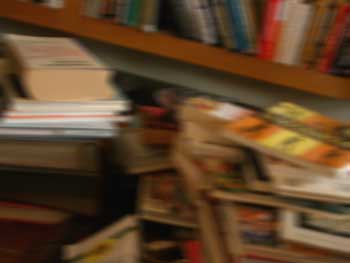
GOODBYE BOOKS
One of our agreed tasks this week has been to do what we've been talking about for a long while - go through the books and actually get rid of those that no longer mean anything to us. Note that I didn't say "those we'll never read again" - because there are books on our shelves that I doubt either of us will re-read but we wouldn't part with for anything. No, this is a purge of dead weight, of books that are pointless taking up shelf space in this particular house. Some would see this is a wrenching, even devastating process -- when one of my friends moved into a retirement home it was the dismantling of his library that affected him the most: "like having my limbs amputated," he said. I'd probably say that too, if I had to give up my shelf of Russian literature, or choose between keeping poetry books or art books. Maybe someday it will come to that - I hope not - but the books on the floor are more of the how-to variety - I don't need my cold-climate gardening book anymore, and cookbooks I haven't used in two decades are not likely to enhance our cuisine around here anytime soon. What surprised both of us is that, once we also take away computer software documentation and old magazines, the volume is reduced by 1/3 to 1/2: leaving the literature and essays, religion and history, sociology and cultural studies, poetry, art and photography books that really do matter to us, as well as some sentimental volumes that remind us of the original owner or the giver.
All of this book-weeding brings me back to the desert-island book meme, and all the lists I've read on various blogs. (We may complain, but wasn't it pretty interesting to see what everyone chose?) If I had it to do over, this week, I wonder if I might simply take five of the fattest blank books I could find. On a desert island, or in solitary confinement, would it be worse not to be able to read, or not to be able to write?
9:52 AM
|
Tuesday, April 05, 2005
MORE ON THE POPE
Lorianne at Hoarded Ordinaries has written a thoughtful, personal, and ususual reflection on the death and life of the Pope.
2:18 PM
|
Monday, April 04, 2005
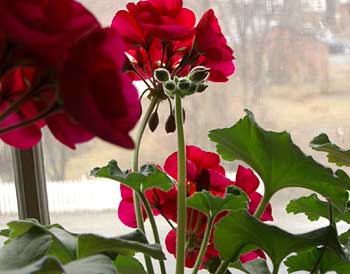
The geraniums think it's spring...
PURPLE CROSS
This is a scene we're missing, not being in Montreal during the time of the Pope's death and funeral. And we're sorry, because it would be interesting, and no doubt moving, to see the reaction and observance of his life and passing in this very Catholic city. According to articles in the Montreal papers, Mary Queen of the World Cathedral was packed with mourners. That's unusual: the huge Catholic churches in every neighborhood, including ours, are virtually empty on Sundays - cavernous, ornate monuments to the past grip that the Catholic Church used to have over nearly every French-Canadian living in Quebec. La Presse recently ran a series of articles on religion, noting that among Catholics and Protestants religious practice and attendance continues to be in a steep decline - it's a very noticeable difference to us, as Americans - but belief and acceptance of institutional authority are two different things. the Pope's death brought the people out, and their sincere grief was expressed openly in what they said he had meant to them. John Paul II had visited Canada, and this was also well remembered. It's a tradition that the lights on the cross on the top of Mont Royal, overlooking the city are turned purple in the event of the death of the Pope -- and purple they apparently are right now, glowing rather eerily through the fog.
My Muslim friend Shirin came over last night and asked if she should offer her condolences. I thanked her and smiled, saying "He's not my Pope." I've never been a fan of the papacy, seeing it as a symbol of the institutional church writ large; of politics, wealth and intrigue; a bastion of traditionalism and conservative values; an obstacle to modernity that had a particularly deleterious effect on the lives of women. Thinking about it recently, I realize that my positive feelings had mostly to do with the art that the Vatican owns, although I haven't seen much of it, never having been to Rome - a show of da Vinci drawings, and my memorable look at Michaelangelo's Pieta in the Vatican Pavilion at the New York World's Fair. I had hopes for the Catholic Church after Vatican II, hopes that were dashed by the conservative clamp-down that came afterward.
Yesterday, though, I read the long special section on John Paul II in the Montreal Gazette, including an excellent biographical article picked up from the Los Angeles Times, and looked at a photo gallery of the Pope's long life - and I found that my attitude softened. John Paul was more complex than I had realized. His conservatism on personal matters, and his opposition to the ordination of women and to liberation theology in South America were certainly as strict and uncompromising as I had always thought. But he had also been a consistent voice for peace and for interfaith respect and dialogue, two issues that are closest to my heart. He added a strong voice to the liberation of his Polish homeland and undoubtedly helped the fall of communism. He apologized for the church's role in anti-Semitism, while being steadfast in his support for the rights of the Palestinian people to have their own homeland and to live in peace. He continually opposed war, genocide, torture, and capital punishment. And in the photographs one saw a man willing to meet people of every religion and every race, willing to use his own body and the power, such as it is, of his office, to show respect and to encourage dialogue and peaceful communication rather than violence.
I looked at photographs of the Pope with Castro and with Reagan, with Hindu leaders and Muslims, with Anglican and Orthodox Christian leaders, with whom he tried to heal very very old rifts. And since the photographs were chronological, I watched him get older and more frail, but the accompanying stories showed his intense determination and awareness of the symbol he was to so many people - so he finished speeches even when he was very ill, he walked when it was difficult for him, he kept traveling almost to the end. I couldn't help but admire that.
My feelings about the institutional church and the Papacy are colored by my enormous resistance to clerical authority, and my abhorence of masses of people accepting anyone's word for what they should think and do, especially in the most personal areas of their lives. Knowing the extent of human frailty and self-deception, I cannot accept that any human being, by virtue of their high priestly office, is God's anointed representative, empowered with special knowledge or the ability to pardon sins. I am more than ready to humbly listen to and learn from the immense knowledge and experience of certain religious people - both ordained and non-ordained. But I cannot, and never have, accepted someone's authority to interpret scripture or tell me what to do or think simply because they were "my priest" or "my bishop". Religious fundamentalism and conservatism, in all faiths and in cults as well, have shown us where that road can lead. But even in my church, there are many well-educated people who will not question the authority of the priest, don't trust their own ability to read and grapple with scripture or church history, or who can't seem to take on their own ministries, in or out of the church, without the priest's "approval". I sometimes think that one reason I have so many close friends among the clergy is precisely because I don't think that way. But my clerical friends, not surprisingly, tend to be of the progressive ilk, and are going about their ministries with eyes wide open to a changing world and an awareness that the Church, too, must change to meet it. They also tend to be people who realize that true authority is earned, not conferred along with a degree or a title.
Two photographs of the Pope have stayed in my mind especially. One is a black-and-white shot of the white-robed Pope, small and seen from the back, talking in a high-ceilinged jail cell to the man who tried to assassinate him. The other is of him as a very old man, in the same familiar white robes and skullcap, sitting at a small desk set on a large grassy lawn surrounded by trees, somewhere in Italy. He's bent over, he's all alone except for a few books, and he looks up as if to say, yes, I'm still here, I can't get up, take the picture. It's a bizarre photograph, of what must be one of the strangest jobs in the world.
5:04 PM
|
Saturday, April 02, 2005
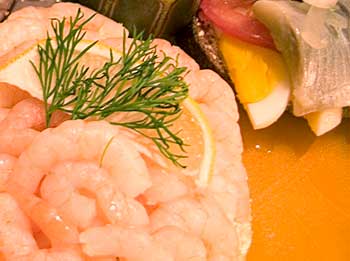
SMRREBRD
The other night, our wonderful Icelandic neighbors, happy to see the lights on again in our house, invited us for dinner. H. had just returned from Iceland, laden with foodstuffs. On the phone he told us he was cooking fish, but when we arrived he said, no, it was going to be smrrebrd.
“Sit!” he commanded, filling small glasses with ice-cold akvavit and larger ones with our choice of beer or white wine. And out of the kitchen, with a flourish, came two platters of the most beautiful composed sandwiches I have ever seen, of a special, dense, Danish rye bread spread with butter, and then topped with veritable sculptures of appropriately combined shrimp, hard-boiled eggs, an Icelandic liver pate topped with slices of port-wine aspic, marinated herring, salami, onions, and Icelandic caviar, garnished with sprigs of fresh dill. I especially love herring, and the caraway-flavored aquavit was the perfect accompaniment. It was, in a word, a feast.
Smrrebrd is the Icelandic word for smorgasbord. Looking up “smorgasbord” to make sure I was spelling it correctly, the dictionary confirmed H. and E.’s explanation that the word means bread (brd) and butter (smrre). The word smorgasbord is Swedish; the origin of its first half is the Old Norse word smör or smjör , meaning fat or butter. (It’s no leap to realize that’s the source of our English word “smear”.) But it’s interesting that smorgasbord -- originally a selection of these beautifully composed sandwiches -- has come to mean a buffet, with a large selection of unrelated dishes –anything from cold lobster to baked beans. More generically, we've come to use the word to mean a mixture or even a “hodgepodge” -- which is not at all a description of the culinary artworks we ate that night.
4:47 PM
|
Friday, April 01, 2005
BUSY, BUSY
As I guess is fairly obvious, I've been pretty occupied this week without much time for writing (well, I've been writing, as part of a big project I'm in charge of, but that's rather different.) I feel like I've hardly looked around myself since coming back down here, although for the first time since winter began I was able to take a walk around my garden and check on the plants - always a happy occasion. I found two roses that I'm worried about (standard for northern New England - you just take your chances with roses unless you are willing to bury them each fall, even the rugosas sometimes succumb), and the crack in the trunk of the weeping Siberian peaberry seems larger, but other than that everybody looks like they made it through the winter - reddish-brown tulip shoots are up, the Oriental poppies are growing little soft tufts of leaves, and the daylilies are poking green leaf-tips through the thawing snow and mud. It's too early to rake the leaves off the perennial beds - we had sleet last night - but it won't be long now. On the drive down here we saw many flocks of migrating geese, including one group of snow geese over a Canadian cornfield. Now I can hear redwing blackbirds calling in the trees outside, and the robins are bouncing around in back of the house, looking for worms. Q.E.D.
One of my top priorities, besides the ruthless purge of our bookshelves we've vowed to do this spring and the replacement of the curling linoleum floor tiles in our bathroom, is to move my blog and finally get off Blogger. I'm really distressed about the slow loading times and the ridiculous problems accessing the Blogger site and then losing posts during publication (which of course wouldn't be so bad if I remembered to copy them first, or write them in a word processor). I've started a non-public shadow-blog on Typepad to see how I like it, but I'd be grateful for your suggestions about various weblog software and hosting services. I'd especially like to hear from Typepad users about your experiences with managing comment spam, which (knock on the old maple chair) has not been a problem for me so far.
5:08 PM
|
|
|